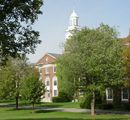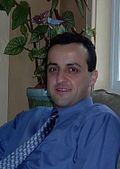Difference between revisions of "Metal ions and metalloproteins"
m (fmt) |
(→Invited speakers: Update) |
||
| Line 9: | Line 9: | ||
| − | == | + | ==Confirmed speakers== |
| − | + | *[http://xbeams.chem.yale.edu/~valentine Prof. Ann M. Valentine], (Yale University): Nicatransferrin and Serum Ti(IV) Transport | |
| + | *[http://www.chem.duke.edu/~alc/labgroup/crumbliss.html Prof. Al Crumbliss] (Duke University): Iron Transport in Bacteria | ||
| + | *[http://www.smbs.buffalo.edu/bch/Labs/Kosman/index.htm Prof. Dan Kosman]: (University of Buffalo): Multicopper Ferroxidases: A Workshop on Copper Coordination Chemistry, Electron Transfer and Metallophysiology | ||
| + | *[http://www.dartmouth.edu/~chem/faculty/dew.html Prof. Dean Wilcox]: (Dartmouth College): Thermodynamics of Metal-Protein Interactions | ||
[[Category: NERM program listings]] | [[Category: NERM program listings]] | ||
Revision as of 02:47, 6 January 2010
Metal ions are essential nutrients for all organisms and play important roles in many biochemical processes. The diverse network of proteins and enzymes involved in intra- and inter-cellular metal trafficking pathways is very complex but highly specific and tightly regulated. Abnormal cellular metal ion concentrations may lead to oxidative damage (particularly for redox-active metals such as Cu and Fe), various diseases and cell death. While many aspects of metal-ions trafficking have been addressed by biochemists and cell biologists, chemists provide yet another layer of information that is crucial to a better understanding of these transport pathways, whether it is related to metal-ions specificity, affinity, kinetics and thermodynamics. Understanding the molecular and mechanistic details of metalloenzymes and the processes they undergo opens up opportunities for metal-ion chelation, detoxification, anti-tumor and anti-cancer therapies. This symposium will address various aspects of metal ion homeostasis and discuss structure-function relationships of a number of metal-ion binding, transport and storage proteins and processes.
Organizer
Dr. Fadi Bou-Abdallah is an assistant professor of chemistry at SUNY Potsdam. He obtained a BS in chemistry from the Lebanese University (in Lebanon) and a PhD in physical chemistry from the University of Paris VI (France). Prior to joining SUNY Potsdam, he was a Research Scientist at the University of New Hamsphire where he did his postdoctoral work on the iron storage protein, ferritin. His research interests are in the areas of iron-protein biochemistry in particular proteins involved in the metabolism of iron, i.e. ferritin and transferrin. The overall goal of his research program is to elucidate the structure-function relationships in these and other metal-ion trafficking proteins and their mechanisms of interaction with various metal-ions.
Confirmed speakers
- Prof. Ann M. Valentine, (Yale University): Nicatransferrin and Serum Ti(IV) Transport
- Prof. Al Crumbliss (Duke University): Iron Transport in Bacteria
- Prof. Dan Kosman: (University of Buffalo): Multicopper Ferroxidases: A Workshop on Copper Coordination Chemistry, Electron Transfer and Metallophysiology
- Prof. Dean Wilcox: (Dartmouth College): Thermodynamics of Metal-Protein Interactions

